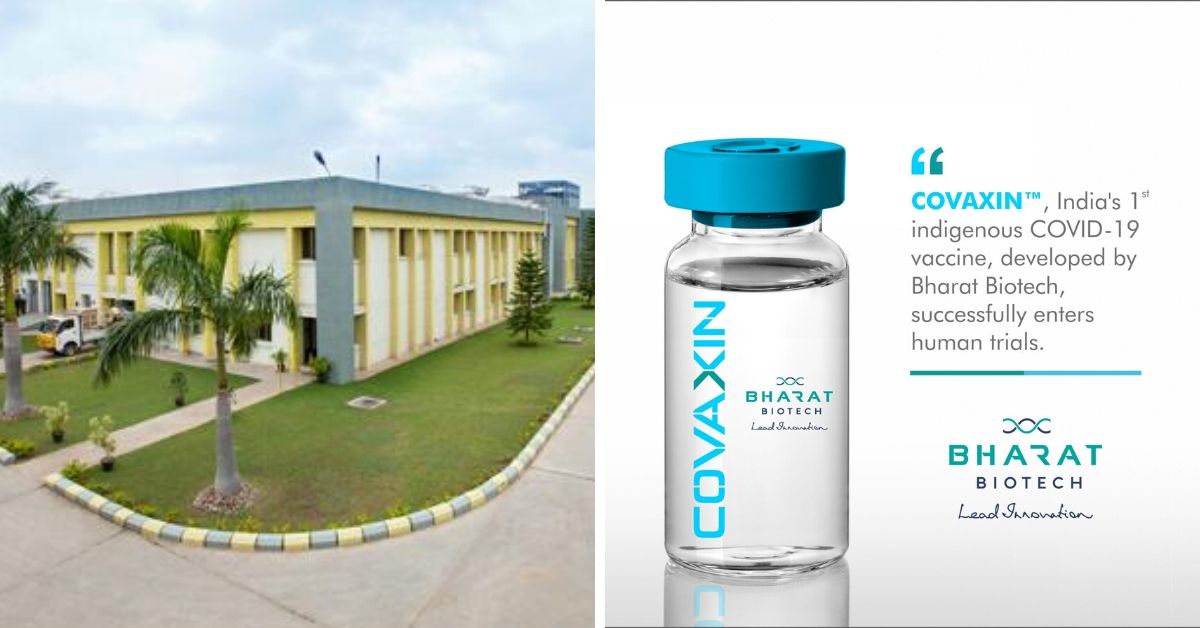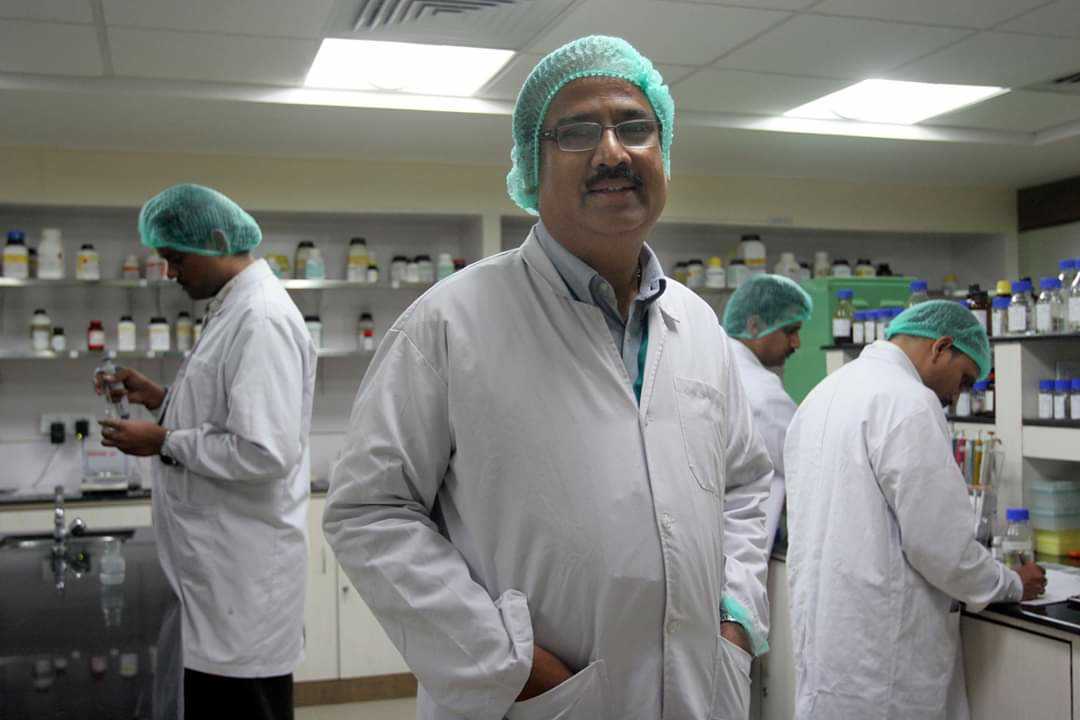8 Things You Probably Didn’t Know About The Maker of India’s First COVID-19 Vaccine
The world's cheapest vaccine, the world's first vaccine for zika virus, and a series of patents--Bharat Biotech has given humankind several breakthroughs in the field of medical science.

In a major breakthrough, Hyderabad-based Bharat Biotech has received a nod to develop India’s first vaccine against the novel coronavirus.
The Central Drugs Standard Control Organisation has given approval to the company for conducting clinical trials for its vaccine, christened as ‘COVAXIN’. The clinical trials (Phase I and II) for infected people are expected to start across India July onwards.
Dr Krishna Ella, Chairman and Managing Director of the company, has collaborated with the Indian Council of Medical Research (ICMR) and the National Institute of Virology (NIV) for developing the vaccine.
“We are proud to announce COVAXIN, India’s first indigenous vaccine against COVID-19. The collaboration with ICMR and NIV was instrumental in the development of this vaccine. Our R&D and manufacturing teams worked tirelessly to deploy our proprietary technologies towards this platform,” Ella said in a press release.
The COVID-19 vaccine will not be a ‘first’ for Bharat Biotech. The pioneering biotechnology company has made several breakthroughs in medical science in the past.

Here are eight cutting-edge facts about the company:
1) First Made-In-India Vaccine
In a major boost for India’s national immunisation programme, Bharat Biotech developed the first locally-made vaccine against rotavirus gastroenteritis in 2014. Known as ‘Rotavac’, it was also ‘pre-qualified’ for the first time by the World Health Organization (WHO).
The company also held the country’s first efficacy clinical trial (for Rotavac) with around 6,800 participants from Delhi, Pune, and Vellore. The results were published in journals such as The Lancet and Vaccine.
Its oral version, Rotavac 5D, is also the world’s lowest dose-volume rotavirus vaccine.
Rotovac made it to the Indian government’s National Immunisation Programme in 2016, under which around 3.5 crore doses were administered as of 2018.
Read more here.
2) The World’s Cheapest Hepatitis Vaccine
Ella began working on the Hepatitis B vaccine in a small lab in 1995. He failed to get funding because of his cost-effective proposal. The investors didn’t trust the man whose vaccine was merely $1 as against the market rate of $35-40.
In 1998, India’s former President and eminent scientist Dr A P J Abdul Kalam launched Revac-B+® — world’s first Cesium Chloride free Hepatitis B vaccine created by the company. A year later, the company expanded its capacity to 100 million doses and became the largest global manufacturer of the Hepatitis B vaccine.
The best part about this vaccine was that it was manufactured without any preservatives. At Rs 10 per dose, the company supplied 35 million doses to the Indian government, thus making it the world’s cheapest Hepatitis B vaccine.
3) World’s First Zika Vaccine
In 2016, Bharat Biotech was believed to be the first company to have filed a global patent for a vaccine for Zika virus called Zikavac.
The company had unveiled two vaccines against the outbreak of the mosquito-borne Zika virus. Close to 87 countries have suffered from the deadly virus.
Currently, Phase I clinical trials for Zika are underway.
4) India’s first Cell-cultured Swine Flu Vaccine
In 2010, Bharat Biotech made history by launching India’s first indigenously developed cell culture H1N1 swine flu vaccine under the brand name HNVAC.
The vaccine is manufactured in cell culture that is a highly sterile and controlled process, instead of eggs. The HNVAC vaccine helps to prevent the spread of H1N1 pandemic influenza, which can be fatal.
The vaccine was successfully tested in Phase I, II and III clinical trials, and it passed the safety test. It was developed with approved strains from WHO and the Center for Disease Control and Prevention (CDC) Atlanta.
5) 160 Global Innovative Patents
From non-alcoholic vaccine compositions free from animal cruelty, a gel to treat diabetic foot ulcers to the first-ever recombinant Hepatitis B vaccine, the company owns 160 global patents for vaccines and therapeutics.
“Bharat (Biotech) believes in being a fertile breeding ground for fresh ideas to target some of the most challenging diseases. Our research laboratories have produced an impressive succession of innovative vaccines and biotherapeutics,” says the website.
Check all their patents here.
6) A Billion Doses Across The World
From Zika, Chikungunya, to Hepatitis B, the company has delivered more than three billion vaccine doses all over the world, as per its website.
All its manufacturing facilities have received approvals from the US Food and Drug Administration, South Korea’s Ministry of Food and Drug Safety, and the WHO.
7) Pro-Environment Measures
Bharat Biotech is one of the responsible companies that has followed the safety standards for handling waste as prescribed by the Central Pollution Control Board.
As per the WHO inspection report, colour-coded waste disposal containers for infectious and noninfectious waste are kept on the premises.
All the chemicals used are treated in their in-house wastewater treatment plant, which has a capacity of 120 kilolitres per day (KLD), before releasing them safely.
Other safety norms include pre-treatment (sterilisation) and HEPA filters that prevent the accidental release of genetically modified organisms.
8) Multiple Clinical Trials
Clinical trials are a significant aspect of medical advancements and the discovery of new treatments for diseases. The final aim is to figure out the safety, efficacy, and dosage of a particular drug.
Clinical trials take place in phases and with each phase, the number and demography of participants increase. Bharat Biotech has conducted extensive clinical trials in the past with prior approvals from the National Regulatory Authority.
Some of their notable trials include over 6,000 participants for Rotavac, 700 for Phase III trials for TYPBAR-TCV (Typhoid Conjugate Vaccine), and Phase I clinical trials for Zika and Chikungunya.
India has crossed six lakh positive cases of coronavirus, and with each passing day, the numbers of those affected are only increasing. In such precarious times, Bharat Biotech’s vaccine could bring us a step closer to a cure for the global pandemic.
For now, the company has not given a timeline, but the trials are conducted in 3-4 phases on average, which could take up to a year. So, we can expect COVAXIN in 2021 at the earliest.
(Edited by Shruti Singhal)
Like this story? Or have something to share?
Write to us: [email protected]
Connect with us on Facebook and Twitter.
If you found our stories insightful, informative, or even just enjoyable, we invite you to consider making a voluntary payment to support the work we do at The Better India. Your contribution helps us continue producing quality content that educates, inspires, and drives positive change.
Choose one of the payment options below for your contribution-
By paying for the stories you value, you directly contribute to sustaining our efforts focused on making a difference in the world. Together, let’s ensure that impactful stories continue to be told and shared, enriching lives and communities alike.
Thank you for your support. Here are some frequently asked questions you might find helpful to know why you are contributing?


This story made me
-
97
-
121
-
89
-
167











